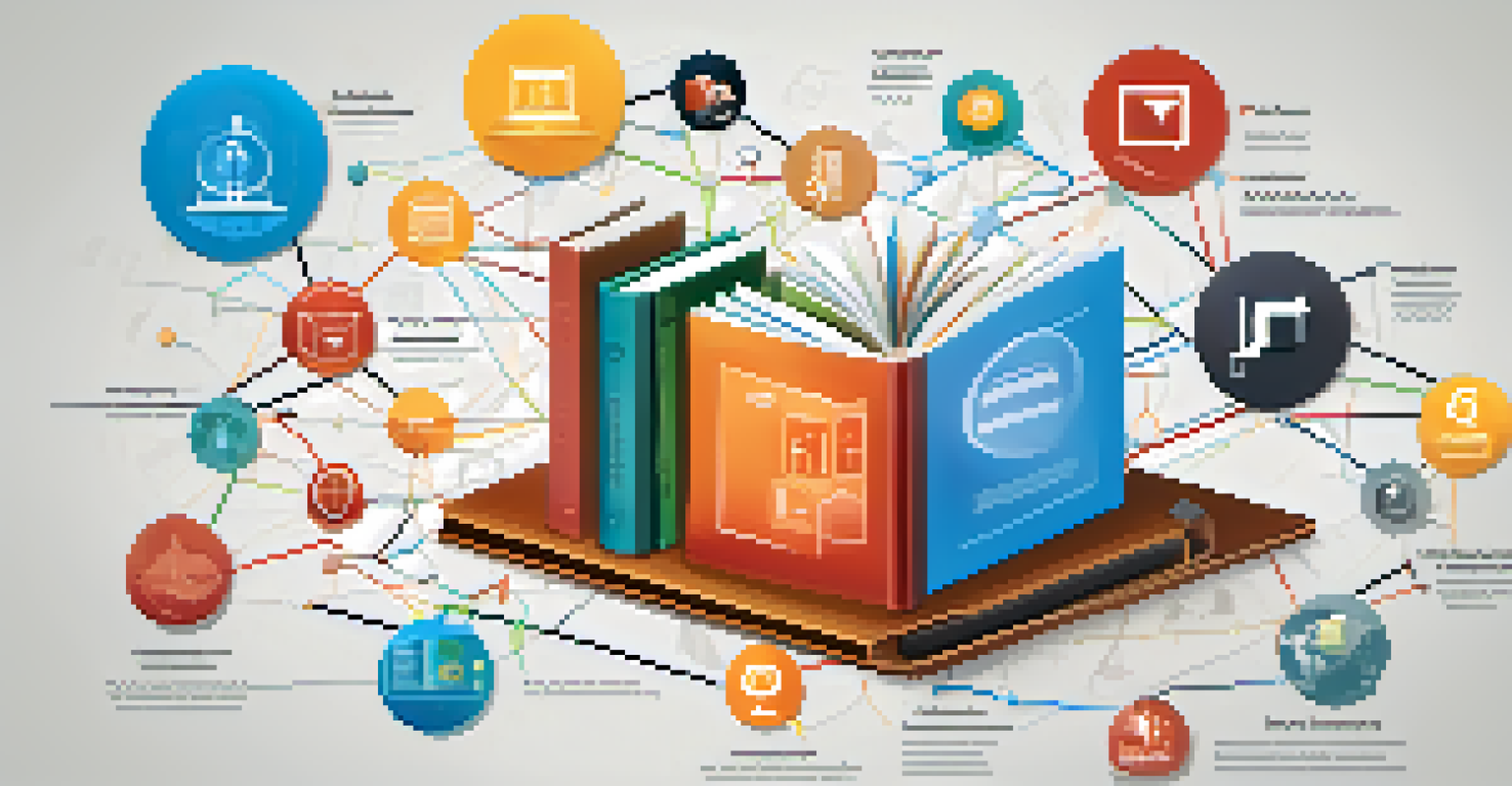The Role of Government in Supporting Open Educational Resources

Understanding Open Educational Resources (OER)
Open Educational Resources, or OER, are teaching materials that are freely accessible and openly licensed. They range from textbooks to videos and entire courses, allowing educators and learners to adapt and share them without significant costs. With rising educational expenses, OER offers a viable alternative, promoting equitable access to quality learning materials across diverse communities.
Open Educational Resources are a powerful tool for promoting equity and access in education.
The appeal of OER lies not just in their cost-effectiveness but also in their adaptability. Teachers can modify these resources to fit their specific teaching styles or the needs of their students, fostering a more personalized learning experience. This flexibility makes OER a powerful tool in addressing various educational challenges, from curriculum gaps to diverse learning preferences.
As we explore the role of government in supporting OER, it’s essential to grasp why these resources matter. By investing in OER, governments can help bridge the educational divide, ensuring that all students, regardless of their background, have access to high-quality learning opportunities.
Government Initiatives Promoting OER
Governments worldwide have initiated various programs to promote the development and use of OER. For instance, some countries have launched funding schemes that support the creation of openly licensed educational materials. These initiatives not only incentivize the production of OER but also encourage collaboration among educators, institutions, and technology providers.

In addition to funding, governments often establish policies that prioritize OER in educational settings. Policies can mandate the inclusion of OER in public education systems, ensuring that these resources are integrated into curricula. This top-down approach reinforces the importance of OER and signals to educators that these resources are valued and supported.
OER Enhances Educational Access
Open Educational Resources (OER) provide free and adaptable learning materials, promoting equitable access to quality education for diverse communities.
By fostering an environment where OER can thrive, governments play a crucial role in transforming the educational landscape. Their initiatives can lead to more innovative teaching practices, increased collaboration, and ultimately, better learning outcomes for students.
Funding and Grants for OER Development
One of the most significant ways government supports OER is through funding and grants. These financial resources enable institutions and educators to create high-quality open materials that might otherwise be too costly. By alleviating the financial burden, governments empower educators to innovate and develop resources tailored to their specific needs.
Collaboration is key to the success of open educational resources; when governments and institutions unite, they can create a richer educational landscape.
For example, some governments offer competitive grants to encourage the production of OER in various subjects, from STEM to the arts. These grants not only support individual projects but also foster a culture of sharing and collaboration among educators. Through funded initiatives, institutions can share best practices and learn from one another, leading to a richer pool of educational resources.
Furthermore, government funding often comes with a stipulation that the produced materials remain open and accessible. This requirement ensures that the investment benefits the broader community, allowing students and educators everywhere to benefit from the resources created.
The Importance of Policy Frameworks for OER
Effective policy frameworks are essential in guiding the development and implementation of OER. Governments can establish clear guidelines that outline how OER should be used, shared, and credited. Such frameworks help ensure that OER is integrated into existing educational systems smoothly and effectively.
A robust policy can also address issues such as copyright and licensing, providing clarity for educators and institutions. By demystifying these legal aspects, governments can encourage more educators to adopt OER without fear of infringing on intellectual property rights. This clarity is vital for fostering a culture of sharing and collaboration in education.
Government Funding Fuels OER Growth
Government initiatives, including funding and grants, empower educators to create high-quality OER, fostering collaboration and innovation in educational materials.
In addition, well-crafted policies can promote equity in access to OER. Governments can prioritize the development of resources that address underserved communities, ensuring that all students can benefit from high-quality educational materials.
Collaborative Efforts Between Governments and Institutions
Collaboration between government entities and educational institutions is crucial for the success of OER initiatives. When these groups work together, they can identify gaps in educational resources and develop strategies to address them. This partnership ensures that OER aligns with the needs of both educators and students.
Many successful OER projects arise from collaborations that bring together universities, K-12 schools, and governmental agencies. For instance, a state education department might partner with local universities to create OER that meets specific curriculum requirements. Such partnerships not only enhance the quality of the resources but also foster a sense of community and shared purpose.
Furthermore, these collaborations can lead to sustained support for OER initiatives. By pooling resources and expertise, governments and institutions can create a more vibrant ecosystem for open education, ultimately benefiting learners at all levels.
Training and Support for Educators
To effectively implement OER, educators require training and ongoing support. Governments can play a significant role in providing professional development opportunities that equip teachers with the skills needed to utilize and create OER. This training not only boosts educators' confidence but also enhances their ability to deliver quality education.
Workshops and online courses focused on OER can help educators become familiar with the tools and resources available to them. Additionally, creating communities of practice allows teachers to share their experiences, challenges, and successes in using OER. This collaborative environment fosters a culture of continuous improvement and innovation in teaching.
Policies Guide OER Implementation
Effective policy frameworks are essential for the successful integration of OER into educational systems, addressing copyright issues and promoting equitable access.
Moreover, ongoing support from government initiatives can help educators stay updated on new developments in OER. As the landscape of educational resources evolves, having access to current information and resources is essential for educators aiming to provide the best possible learning experiences for their students.
Measuring the Impact of Government Support on OER
Evaluating the effectiveness of government support for OER is essential in understanding its impact on education. Metrics such as the number of OER created, the level of engagement from educators, and the accessibility of these resources can provide valuable insights. By assessing these factors, governments can make informed decisions about future investments in OER.
Additionally, gathering feedback from educators and students can help gauge the usefulness and quality of OER. Surveys and focus groups can reveal how these resources are being utilized in classrooms, highlighting areas for improvement or further support. This feedback loop is essential for refining government strategies and ensuring that OER meets the needs of its users.

Ultimately, measuring the impact of government support on OER can lead to more effective policies and initiatives. By continually assessing outcomes, governments can foster an environment where open educational resources thrive and contribute to a more equitable education system.